

Chuang Tzu Series « The Rambling Taoists. Unlike the previous series on the Tao Te Ching and Wen Tzu — which were solely written by The Rambling Taoist (RT) — both Scott Bradley (SB) & I will be contributing to this one.
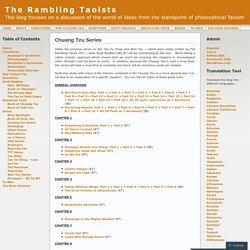
We’re taking a rather eclectic approach which means that we won’t be covering the chapters in chronological order (though I will list them as such). In addition, because the Chuang Tzu is such a long book, this series will take a long time to complete and there will be numerous posts per chapter. Scott also deals with many of the themes contained in the Chuang Tzu in a more general way (i.e., not tied to an explanation of a specific chapter). You can find an index of these posts here. Quasimodo Revisited (RT) Blessings of the Mighty Mudball (RT) Putting on Airs (RT) The Crack of the Whip (RT) The Way of Thieves (RT) Moving On (RT) Walking in the Nameless, Part 1 + Part 2 + Part 3 + Part 4 + Part 5 + Part 6 + Part 7 (SB) Dried Fish (RT) Like this: Like Loading... Chapter Index, Tao Te Ching (Dao De Jing) by Lao Tzu (Laozi), Concordance.
Cloud Hands Blog Research, Compilation and Indexing by Michael P.
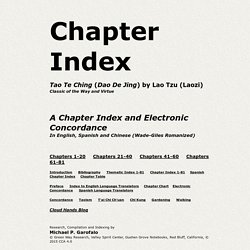
Garofalo © Green Way Research, Valley Spirit Center, Gushen Grove Notebooks, Red Bluff, California, © 2015 CCA 4.0 This work is licensed under a Creative Commons Attribution-NonCommercial-NoDerivatives 4.0 International License. Chapter and Thematic Index Tao Te Ching by Lao Tzu Chapters 1-20Dao de Jing by Laozi Compiled and Indexed by Michael P. Created by Michael P. Chapter 1 Chapter or Verse (chang, zhāng, 章; Capítulo, Sección, Verso) Chapter 2 Términos en Español: Habitar, Actividades, Asuntos, Completado, Terminado, Hermoso, Agradable. Chapter 3. Gu Shen, Ku Shen, The Valley Spirit, The Mysterious Female, Tao Te Ching by Lao Tzu, Chapter 6. Starting on August 1, 2009, this webpage is being updated and maintained at a new location: August 1, 2009 "Taoists use the metaphor of gu shen, "the valley spirit.
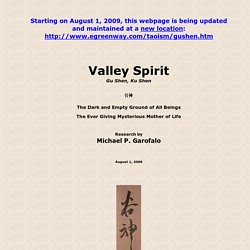
" A valley supports life, feeds the animals who live there and provides fertile earth for agriculture. It can do this only because it is empty. It accepts the flow of the river because it is most low and most humble. Lao Tzu - Tao Te Ching - Explanations. Tao Te Ching by Lao Tzu Translated and Explained. Preface My first meeting with the Tao Te Ching was in my late teens.
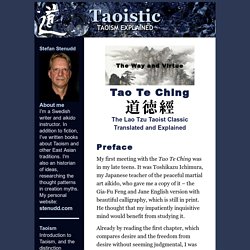
It was Toshikazu Ichimura, my Japanese teacher of the peaceful martial art aikido, who gave me a copy of it – the Gia-Fu Feng and Jane English version with beautiful calligraphy, which is still in print. He thought that my impatiently inquisitive mind would benefit from studying it. Already by reading the first chapter, which compares desire and the freedom from desire without seeming judgmental, I was hooked. That appeals to a teenager.
The book remained with me, far beyond my teen years. Tao Te Ching, which is the major source of Taoism, has a clouded origin. He is said to have departed riding on a water buffalo. His text is around five thousand words long, divided into two parts. Although clear about presenting a worldview and arguing for it, the book is written with the elegance and artistry that makes it most appropriate to call it a poem. That's necessary. That's true for any classic. Stefan Senudd February, 2011. Tao Te Ching by Lao Tzu Translated and Explained - Chapter 1. The Way that can be walked is not the eternal Way.
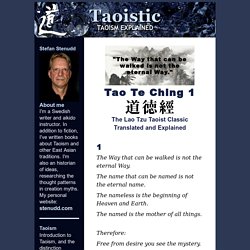
The name that can be named is not the eternal name. The nameless is the beginning of Heaven and Earth. The named is the mother of all things. Therefore: Free from desire you see the mystery. Full of desire you see the manifestations. These two have the same origin but differ in name. That is the secret, The secret of secrets, The gate to all mysteries. It's All Real Lao Tzu begins his writing about Tao, the Way, by stating that the written word cannot fully encompass the real thing. But that also means it can be understood by observing what can be observed: the manifestations. If we want to see beneath the surface, into what really makes up the world, we have to detach ourselves from the attraction of that surface.
This is like an echo of Buddhism, although preceding it. Because we allow ourselves to be consumed by the world, we can't see it clearly. But we don't have to see through the world to manage living in it. Opposites © Stefan Stenudd.